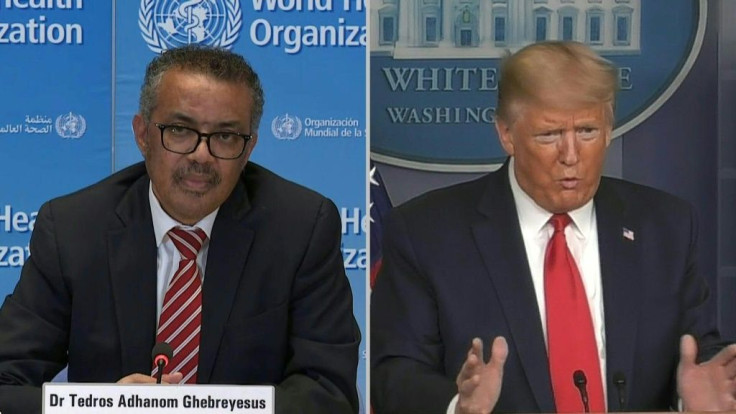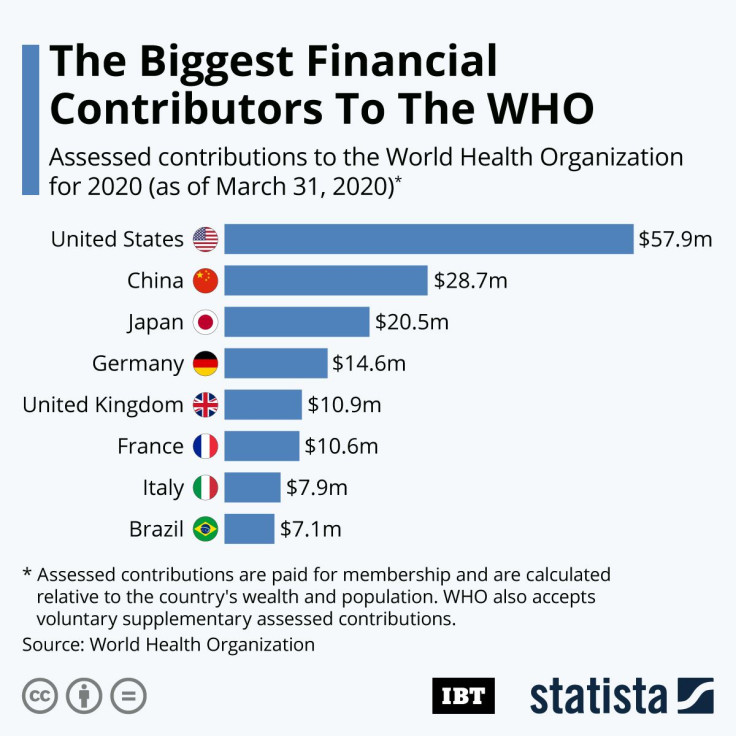Coronavirus Missteps: 'China-Centric' WHO Faces Scrutiny, Taiwan Shows Up Tedros

KEY POINTS
- President Donald Trump was critical of the WHO, saying the organization was “China-centric” and blamed them for getting “every aspect” of the coronavirus pandemic wrong
- Trump also threatened to cut off funding for the organization
- The U.S. is the largest contributor to the WHO, giving a maximum 22% assessed donation and much more through voluntary aids
The World Health Organization (WHO) and its director, General Dr. Tedros Adhanom Ghebreyesus, were being questioned over the handling of the coronavirus pandemic. Among those concerned include the United States President Donald J. Trump and his administration.
The WHO, with headquarters in Geneva, Switzerland, has been in existence since 1948, with a workforce of more than 7,000 people in 150 countries. Its stated mission was “to improve health, particularly among disadvantaged populations.” Any organization the size of WHO will have concerns outside their stated mission and for the WHO, funding and global politics were the primary other issues.
By virtue of its vast relative wealth, the U.S. was the largest contributor to the WHO, giving a maximum 22% assessed donation and much more through voluntary aids that were often two to four times the assessed contribution. Most recently the U.S. allocated $893 million over two years to the United Nations group, a large chunk of their operating budget.

Trump last week railed against the WHO, pointing out in a Twitter message the organization was “China-centric” and blamed them for getting “every aspect” of the coronavirus pandemic wrong as he threatened to cut off funding for the organization. Trump’s sentiments were echoed by Japanese deputy prime minister and finance minister Taro Aso who called the WHO the “Chinese Health Organization,” as reported by Japan’s public broadcaster NHK.
The first of two political issues were the WHO cooperating with China to exclude Taiwan from direct access to the organization, especially when the pandemic was first spreading outside of the former's borders.
The second issue was the WHO director Tedros being an “outspoken advocate” for the Chinese government’s COVID-19 response when there was plenty of evidence that the ruling Communist party covered up some disturbing information about the outbreak. Had the information been known at the time, many lives may have been saved
More disturbing was China’s apparent attempt to silence coronavirus whistleblower, Dr. Li Wenliang, who died from COVID-19.
Michael Collins, a research associate for Asia Studies at the Council on Foreign Relations, wrote in February that Tedros was an “outspoken advocate” for the Chinese government’s COVID-19 response and commented on his praise to China’s leadership in sharing information with the WHO and other countries. Collins mentioned the Munich Security Conference in mid-February where Tedros said “China has bought the world time,” while being swift to criticizing other countries for their responses to the outbreak.
The Chinese response to criticism of Tedros was made by Chinese foreign ministry spokesman Zhao Lijian at a news conference on Thursday (April 9). The official transcript read the WHO and Tedros were, “actively performing its duties and upholding an objective, science-based and impartial position.”
The outrage over Taiwan’s exclusion by the WHO was tempered by the island's relatively low case count of 400 cases and six deaths. The anger over Tedros was increasing as an online petition calling for his resignation neared 1 million signatures. The petition called out the director’s delay in labeling the pandemic as a public health emergency of international concern.
© Copyright IBTimes 2025. All rights reserved.





















